10 Insights About Social Networking For Businesses

The Survey Says...
At the Dreamforce conference this week, Salesforce CEO Marc Benioff (pictured) announced a slew of social networking applications for business to thousands of attendees. "The social revolution is going on right now, and it is unlike anything we've experienced before," Benioff said. "Business is social. Social networking is the fastest growing segment of the industry."
Salesforce is in the midst of an exciting time as it transitions enterprise apps to cloud-based social networking programs such as Chatter.
But, a recent survey of more than 300 managers and employees from companies in the U.S. and U.K, conducted by the research firm iTracks for cloud provider and Salesforce partner Appirio, shows enterprise adoption of social networking is slow, even though workers say they are ready for it.
Continue on to see just what workers are thinking about social networking for business.
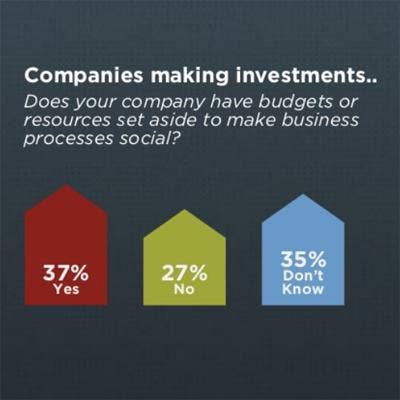
1. Companies Not Rushing Yet To Make Investment In Social Networking
Salesforce CEO Marc Benioff brought out a series of CEOs, CMOs and CIOs at Dreamforce this week to show how companies such as Burberry, Virgin America and Hewlett-Packard are using social networking.
But, the survey shows limited adoption thus far, with just 37 percent of respondents saying their companies have budgets or resources set aside to make business resources social.
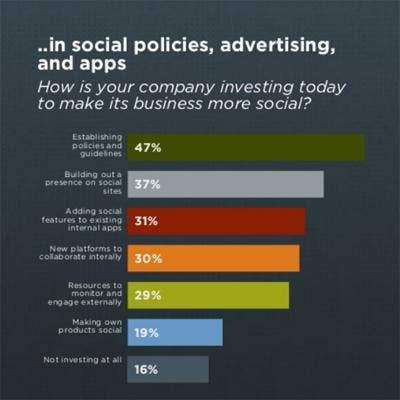
2. One Step At A Time When Going Social
For those respondents whose companies are investing in social networking, many seemed to be taking a cautious approach.
The highest percentage, with 47 percent, said they were investing in policies and guidelines, 37 percent were building out a presence on social networking sites and just 31 percent said they were adding features to existing internal sites.
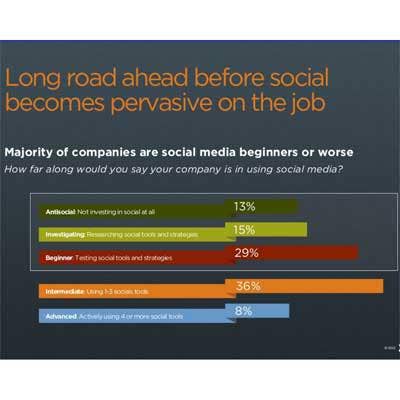
3. Many Companies Still Social Networking Beginners
When asked how far along their company is in using social media, the majority said they are beginners or worse.
The highest percentage of respondents -- 29 percent, said they were beginners, testing social tools and strategies, with 15 percent saying they were investing and 13 percent saying they were "antisocial" and not investing at all. Forty four percent said they were intermediate or advanced in using social tools.
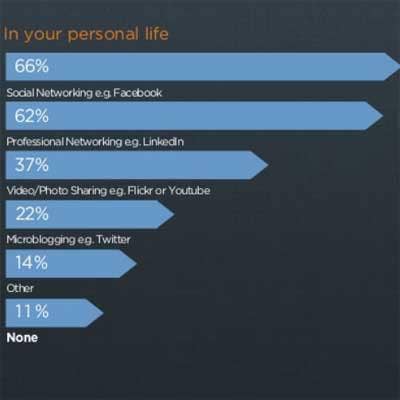
4. Social Networking Is Fun With Friends
People used social tools twice as often in their personal life than they do for their job. After all, it’s more fun to connect with friends, browse LinkedIn and share photos than working, right?
The surveyed showed that 66 percent used social networking such as Facebook, 62 percent used LinkedIn and 37 percent used video or photo sharing with tools such as Flickr or YouTube.
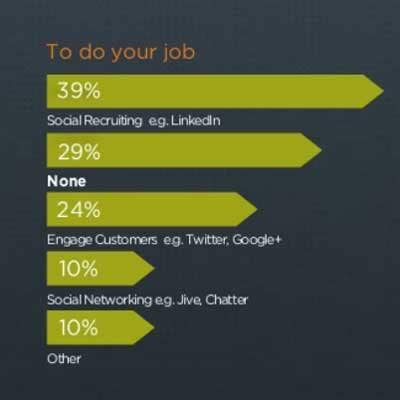
5. The Workplace Lags As A Social Networking Hub
In contrast to the high percentage of respondents using social networking for personal use, 39 percent said they used LinkedIn for recruiting, and 24 percent they engaged customers with tools like Twitter and Google+.
Just 10 percent of respondents said they used tools such as Chatter and Jive, and a whopping 29 percent said they used no tools at all.
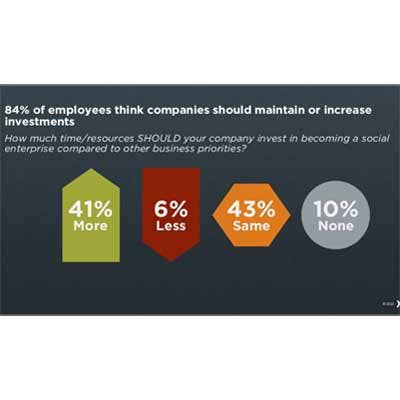
6. Employees Want Social Networking
The future holds hope for an increase in the use of social networking.
When asked what level of investment companies should make in social networking, 84 percent said companies should maintain or increase investments.
Just 16 percent said companies should have less or no investments at all.

7. Customers Are Where The Action Is
When asked where in their company social tools and processes would have the biggest impact, 51 percent of respondents said it would be in attracting new or servicing existing customers.
Attracting new employees, engaging existing employees and improving existing business operations were thought to have the biggest impact of only 21 percent of the survey takers.

8. Brits Look At Social Networking Differently Than Americans
More American survey respondents felt social tools and processes in their company had the biggest impact in attracting new customers, whereas more Brits felt social tools had a big impact in engaging employees and increasing job satisfaction.

9. Company Culture Slows Social Networking Integration
When asked what’s the biggest change that needs to happen for their company to improve use of social tools and processes, the highest percentage, 29 percent, said to shift the culture of the company.

10. Takeaways From The Data
- Involve your workers in your social networking strategy. "You won't be successful if you base your decisions on a small base of executives or decision makers," the survey said.
- To drive strategy and encourage growth and usage, empower owners across groups.
- "Make social a part of your company, not just a task for one group, or something you 'rollout,'" the survey said.
- When investing, focus on what companies believe is important in attracting and servicing customers.
- Get with social networking. The employees say they’re ready for it.